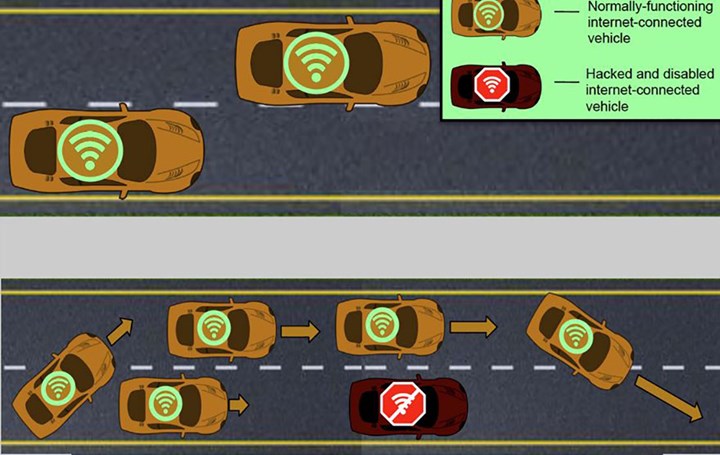Researchers Warn of Gridlock from Hacked Cars
Hackers could bring city traffic to a standstill by tapping in-vehicle internet connections to make cars suddenly stall, according to a new study.
#regulations
Hackers could bring city traffic to a standstill by tapping in-vehicle internet connections to make cars suddenly stall, according to a new study.
The researchers say that stopping 10% of vehicles on a city street could prevent emergency vehicles from maneuvering around them. If 20% of vehicles were incapacitated, all traffic would effectively be halted.
The simulations, using Manhattan traffic as a base, were conducted by Georgia Institute of Technology and Multiscale Systems Inc., a New York-based cybersecurity and advanced materials specialist. The researchers used Percolation theory simulations, which are used in materials science to determine how much of a chemical property, such as specific rigidity, is needed throughout a material.

Their analysis doesn’t take into account the spillover effect of blocked roads, delivery trucks or other traffic obstructions and side effects. As a result, the researchers estimate that hackers could wreak havoc on roads by taking control of “significantly” less than 10% of local traffic.
Mass car hacks in other major U.S. cities likely could be even more problematic. The researchers note that New York’s street grid is more efficient than the meandering streets of many other big cities.
The study warns that hackers can gain access to a vehicle’s central computer network through links to the vehicle’s satellite radio feed or other external connection. Using separate control networks for telematic devices and driving-related functions would help thwart such breaches, the researchers note.
RELATED CONTENT
-
Self-Driving Chevy Bolt Ticketed for Driving Too Close to Pedestrian
Police in San Francisco ticketed the backup driver in a self-driving Chevrolet Bolt for allowing the car to drive too close to a pedestrian in a crosswalk in San Francisco.
-
Dubai to Test Digital License Plates
Next month Dubai will begin testing digital license plates that can display various messages, make payments and conduct other transactions.
-
Toyota Targets 2021 Launch for V2V Tech in U.S.
Toyota Motor Corp. plans to expand its vehicle-to-vehicle communication technology to the U.S. by 2021 and offer it across most Toyota and Lexus models in the country by mid-decade.








